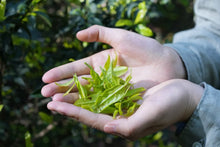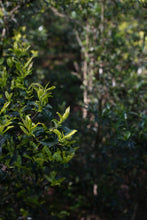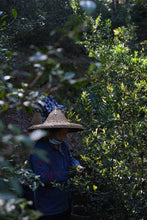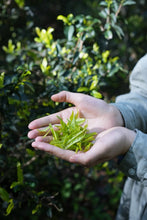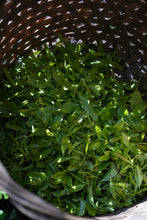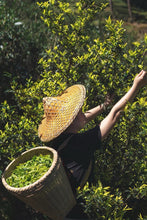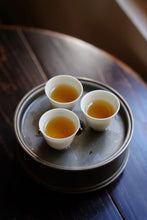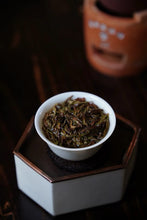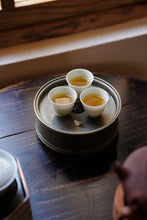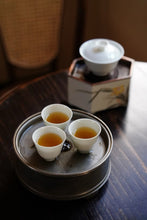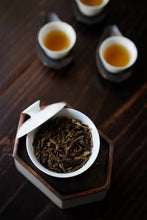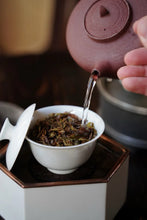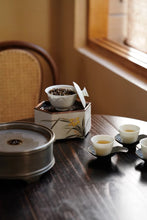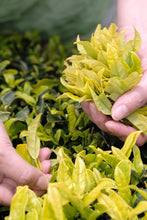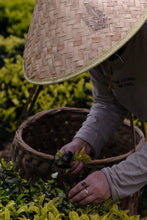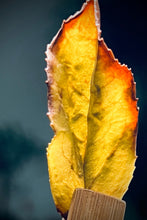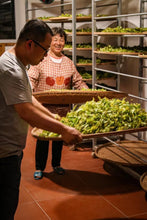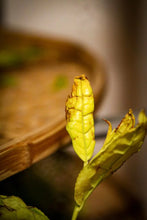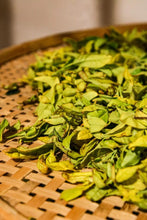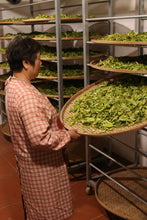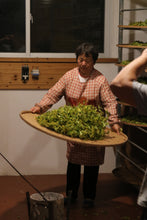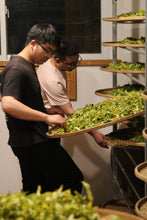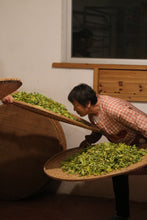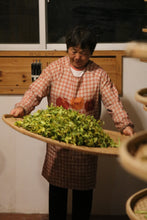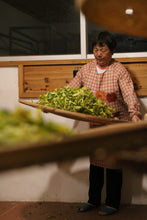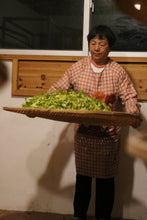
The mist from the Wuyi Mountain streams drifts over the Nine-Turn Stream, condenses into dewdrops on the Danxia rock cliffs, and falls into clusters of silver-green tea trees, creating the most elegant legend among the Four Great Famous Bushes of Wuyi Rock Tea. It carries the delicacy of the mountain spirits, embodies touching legends and unique Taoist charm—this is "Bai Jiguan". In 2025, Tongxin She Teahouse presents the limited-edition Bai Jiguan handmade by Gao Peng and his mother, awakening the true flavor of this "Hermit in Tea" with ancient craftsmanship.
Bai Jiguan, a name full of Eastern imagery, derives from its unique appearance—its buds unfurl like white feathers, with leaves pale yellowish-green, standing proudly among the rock cliffs like white chickens, hence the name. As early as the Ming Dynasty, it became a imperial tribute tea, guarded and presented to the court by temple monks. Moreover, discovered and cultivated by Bai Yuchan, the Fifth Patriarch of the Southern School of Taoism in the Southern Song Dynasty, at the White Snake Cave in Wuyi Mountain, it became a "Taoist Tea" to aid cultivation, its indifferent taste perfectly aligning with the philosophy of "The Great Dao is simple and unadorned". Unlike the boldness of Rougui and the mellow richness of Shuixian, Bai Jiguan has "purity" as its core and "elegance" as its soul, a rare "Literati Tea" among rock teas, with every leaf holding the code of Wuyi's landscapes.
The continuation of this elegant flavor is inseparable from the craftsmanship and dedication of two generations. Gao Peng and his mother deeply understand the art of making Bai Jiguan, following ancient methods while integrating new ideas. At dawn three days after the Spring Equinox, they tread through morning dew to pick one-bud-two-leaf shoots, when the buds have accumulated abundant theanine, the foundation of their fresh and brisk flavor. From sun withering to establish the aroma base, to the alternating shaking, sieving, and resting during leaf oxidation to induce the "green leaves with red edges", followed by careful control of twelve processes including fixation, rolling, and roasting, the mother and son use the intangible cultural heritage wisdom of "making tea according to the leaf condition and weather" to awaken the tea's inner qualities, allowing the tea fragrance to unfold layer by layer like spring water—retaining Bai Jiguan's original freshness while adding depth to the rocky charm.
At the moment of brewing, the tea liquor shimmers golden and translucent like autumn sunlight condensed in the cup. Swirling gently, an elegant orchid fragrance intertwines with the scent of reed leaves, with a subtle sweet aftertaste of citrus and corn silk. The first sip transports you to the Wuyi Mountain streams, with pine wind whispering in your ears and flowing clouds drifting past the cliffs. The second sip reveals the rich rocky bone of the Danxia landform blending with the lively sweetness of the Nine-Turn Stream on the tip of the tongue. At the finish, a cool hint of honey spreads over the throat, like mountain mists dissipating gradually at dusk, leaving the room filled with lingering tea fragrance. This balance of "clear yet not thin, mellow yet not stagnant" is precisely the beauty of Bai Jiguan—like a graceful Song Dynasty ci poem, yet containing a majestic aftertaste, allowing one to read the four seasons of Wuyi Mountain in a single cup of tea.
Tea is never merely a drink; it is leisure, communication, a carrier of mood, a moment of tranquility embodying love for landscapes. In 2025, this limited-edition handmade Bai Jiguan from Tongxin She Teahouse is both a传承 of tea-making技艺 by Gao Peng and his mother and a vivid continuation of Wuyi's thousand-year-old tea heritage. It awaits you in its most authentic form to embark on an elegant encounter.


























